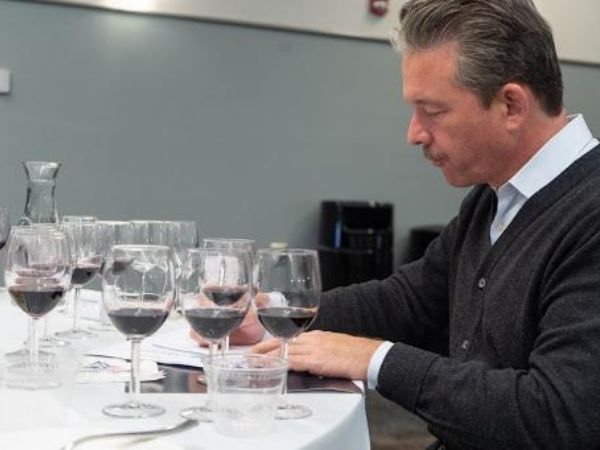Educating Sommeliers Worldwide.
By Beverage Trade Network

I was invited by USA Wine Ratings to help judge their San Francisco wine tasting competition last July and I was intrigued by the way they scored the wines in their competition. All the other wine competitions I have participated in based their scores solely on the flavor and characteristics of the wines. But with the USA Wine Ratings competition, they based their scores on 3 different categories:
This category is what all wine competitions are about and that is the flavor of the wine. Are the flavors reflective of the varietal of the grape is what it is supposed to taste like? Are the flavors reflective of the appellation and terroir of the area? Did the winemaker make good decisions when processing the wine by using barrel aging, stainless steel, or other methods during fermentation to enhance the taste of the wine for the consumer? These are all things that are taken into consideration as we sipped the wines and decided if the wines are amazing in flavor or just another plain Jane.
There are so many different styles that you have to take into consideration because not all Cabernet Sauvignon’s need to be big, bold, and robust. Not all Chardonnay’s need to be oaked and stainless steel fermented Chardonnay’s are very popular nowadays. So our scoring in this category is all about the wine tasting correct to its varietal, tasting balanced and refined, and the wine is enjoyable and pleasing to the palate. Most scoring at wine competitions is solely based on this category alone and yes, it is important. But USA Wine Ratings has other categories we should consider and is important when scoring a wine in full.

Judges picking up their badges and pins as entering
The value of the wine is based on the retail price and is the flavor and quality worth the price we have to pay at the store or restaurant? Over the years, I have come across many great wines that were $15 at the store and they tasted better than the same varietal that was $50 a bottle from a different winery. Of course, everyone’s tastes are different and the flavors I like may not be the same flavors that you like and vice versa. But a fun test would be to do a blind tasting yourself with 5-10 bottles of your favorite varietals of wine (eg – 10 Chardonnay or 10 Cabernet or whatever) and taste through them all without knowing the winery or the price. Just a 1 ounce pour of each works best of course! Find out which wines tasted best to you and what you enjoyed the most.
There will be many that have the same characteristics since they are all the same varietal but you will find that you like a few wines a little bit more than others. Then unveil the wines and see which were your favorite. Was it always the $50 bottle that tasted best to you? Was there a wine that was similar in flavor and quality but was less expensive in price? This is how we evaluated and scored the wines that we tasted. If we felt the expensive bottle was not worth $50, we gave it a lower value score. If the $15 bottle tasted wonderful, then we gave that wine a much higher score for “value” since we felt you are getting more in flavor than what you are paying for. And that is the reason why this category exists and it makes such great sense!

In picture, Charles Curtis MW. USA Wine Ratings aims to have one Master of Wine on each panel along with one on-premise and one off-premise trade buyer.
This category may be more important information for the winery, wine brand, or marketing company but is very important in the retail game. How many times have you passed by an excellent wine with a good price on the shelf but you didn’t reach for that bottle because the label was silly, odd, or just didn’t interest you? Was the label attractive to you where you grabbed it off the shelf and wanted to read the back label to see what that wine is all about? We found many flavorful wines with great prices but the label didn’t “turn us on” so we just passed it by. That is why this category exists and it is such a help to those trying to market their wines.
Of course, we found a few “plunky” wines that had wonderful labels on the bottle and discovered later that it was that eye-catching label that sold us and the wine was not that appealing. In those situations, I guess you have to high five the marketing team on that one. But most of this score is to help the wineries and marketing companies who have the great wines that just don’t sell at the retail rodeo. Next time you go to your favorite wine store, look at all the wine labels in the section you are in and see which ones attract you and which ones you would never pick up. It is interesting why we all pick up different wines because of the label and that is what this category is all about.

Eric C. Sigmund, Esq., CS, CSW, At that time buyer of Total Wine & More checking the wine package for the package score.
This USA Wine Ratings Competition had over 550 wines to taste with 18 judges to sample each wine. All the judges were wine experts and sommeliers with many years in the wine industry. Six of the judges are Masters of Wine who have reached the highest peak in wine knowledge. These six Masters were invaluable sources of information for the rest of us sommeliers who were able to learn from them and sharpen our wine tasting skills and knowledge. We broke up into teams because it is impossible for each of us to taste over 500 wines and still be standing…..even if we were spitting the wines which we were. So there were Masters of Wine at each table as we all tasted through the wines together and then reviewed the wines to everyone in our groups. Many times there were debates about flavor or value but the final score was always decided upon by the Master.
So imagine entering a large room at 10 am with 12 wine samples in glasses in front of each chair. This was “Round 1” of many rounds of wines that would cross our table that day. Most of the morning, we were evaluating white wines and rose’s followed by scoring red wines all afternoon. We all had a “cheat sheet” that told us the wine varietals we were tasting and the regions they were from. After each taste, we would evaluate the flavor profiles and discussed our opinions with everyone at our table. Each one of us did this, agreed or disagreed, but still decided on a fair score for each wine we tasted. And then we evaluated the price of the wine comparing that with its quality and gave a score for the value of each wine. Many wines were priced fairly and were at a good value but we also came across some wines that were fantastic values because they had a lower price along with the excellent quality of the wine that was inside the bottle!
And then came the Big Reveal! After the 12 wines were scored on flavor quality and value, each mystery wine was taken out of its thermal wrapper and shown to us so we could evaluate each label. Some labels were done in a classic style, other labels had animals and pets, some with mermaids and cowboys, and one had a big top circus tent theme! Some labels were very colorful and others were all in black and white. Some labels were fun and some were serious but all had a thought of what may appeal to you in your life and world. Busy labels were often more eye-catching but if the descriptive words were lost in the fray, it was hard to give it a higher score. Does the mermaid wine pair well with fish? (a thought that crossed our minds if the winery wanted to say that). Or was the rugged cowboy on the label describing the wine as rustic, proud, and manly? It is hard to say what those wineries had in mind when their labels were decided on. But one thing that was always decided on was if the labels were readable and if it gave enough description about the wine on the label so you would know what you are reaching for before you get it off the shelf. It was interesting to hear what other sommeliers and wine masters thought about the labels and I think we all learned more about ourselves and how we shop for wine. We put ourselves in the consumer's shoes and hoped we could find labels that would appeal to the masses and were interesting yet eye-catching. But most importantly, we liked the wine labels that gave a good, honest critique of the wine inside the bottle along with the vintage and region it was from, then we felt we had a winner!
After all wines were tasted, evaluated, and scored, the rate sheets and notes were all turned in to our fearless leader. At that point, they would take our information and scores and average them out for each wine to see which wines and wineries would receive a gold, silver, or bronze medal! For a gold medal, that wine would have to score 90 points or more based on all three categories. A silver medal must score 80-89 total points and a bronze medal would score 70-79 points. The list of all of the medal winners for the 2019 USA Wine Ratings Competition is here. Check it out and see if some of your favorite wines and wineries won medals based on the scoring system of USA Wine Ratings. I am sure you will be familiar with many of the names and you may be surprised as well!
I really enjoyed being part of this wine competition for USA Wine Ratings and I thought the scoring system for rating the wines by the taste, value, and label marketing was ingenious! I felt the information and ratings that came from this wine competition would be very helpful for both the newer wine consumer, wine aficionado and the winery itself. What winery or grocer would not want to know which labels were more attractive to its customers to promote higher sales? And what restaurant would not want to know which wines taste best by wine professionals and have a great value in price? In the long run, this scoring system helps the wine stores, restaurants, and grocery chains since the label ratings tells them which labels are most attractive to the wine shoppers in their place of business and hopefully promote more sales for them. It was wonderful judging this wine competition with some very professional Masters of Wine and other experienced wine sommeliers! This is an event I hope to participate in for years to come. For more information about this 2019 USA Wine Ratings Competition, the award winners, and the judges, go to the website
If you are a winery or wine marketing company that wants to know how your wines would score in three distinctive categories with the Masters of Wine and experienced sommeliers, enter your wines soon for the 2020 competition. Cheers!